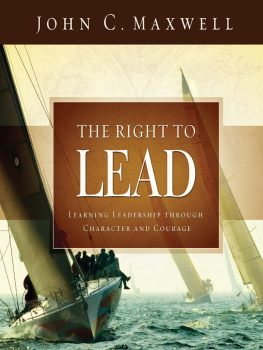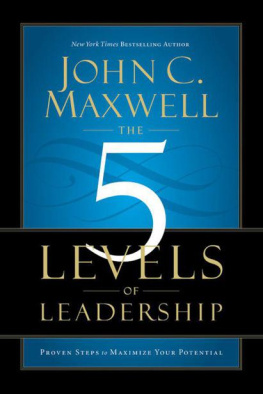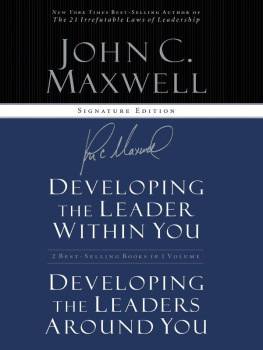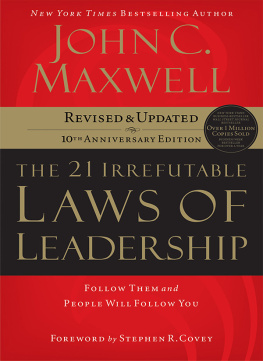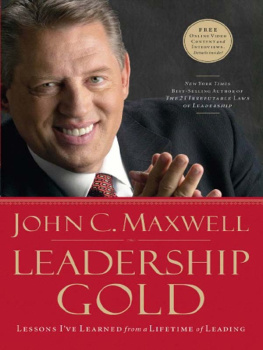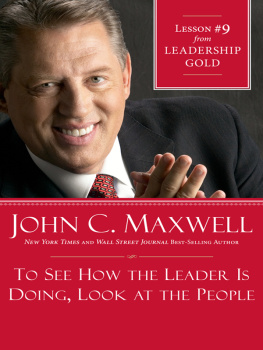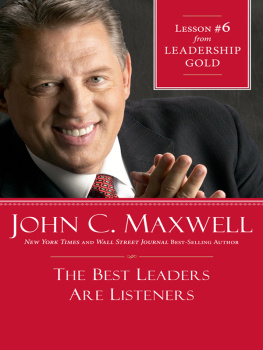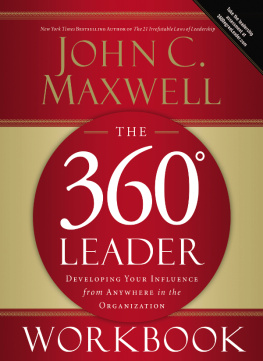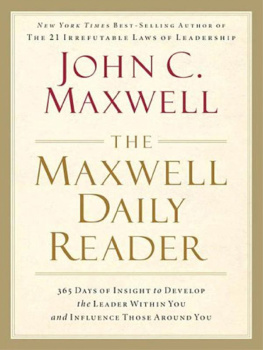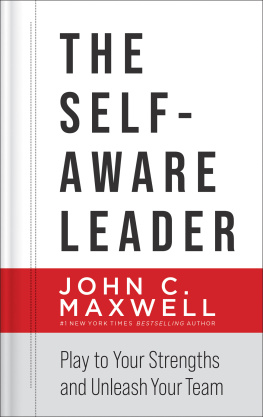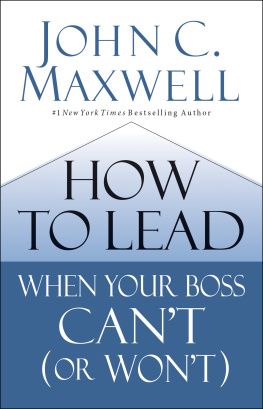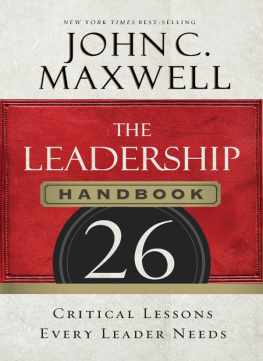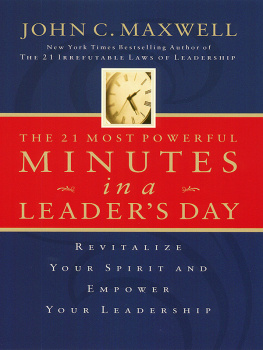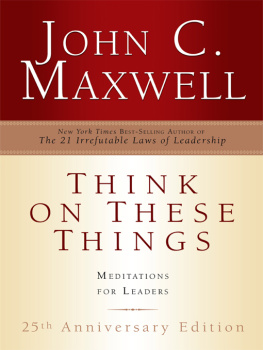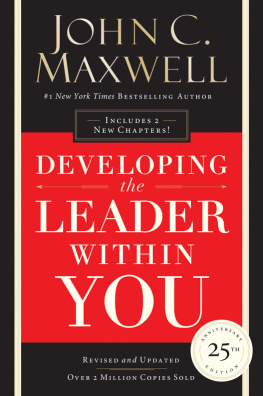
THE RIGHT TO
LEAD
LEARNING LEADERSHIP THROUGH
CHARACTER AND COURAGE
JHON C. MAXWELL

Copyright 2009 Simple Truths, LLC
Published by SimpleTruths, LLC
1952 McDowell Road, Suite 205
Naperville, Illinois 60563
800-900-3427
www.simpletruths.com
This edition published under license from Simple Truths, LLC exclusively for Thomas Nelson, Inc.
All rights reserved. No portion of this publication may be reproduced, stored in a retrieval system or transmitted in any form by any means except for brief quotations in printed reviewswithout the prior written permission of the publisher.
Simple Truths is a registered trademark.
Design and production: Jared McDaniel, Studio430.com
All photos provided by Shutterstock.com
Printed and bound in the United States of America
ISBN 978-1-4041-8942-3
1 2 3 4 5 RRD 13 12 11 10
Printed in China
www.thomasnelson.com
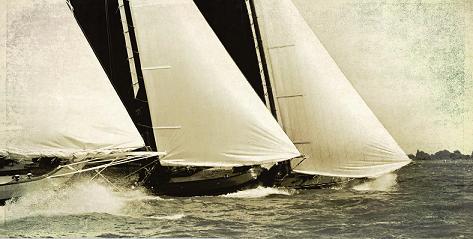
TABLE OF CONTENTS

WHAT GIVES A MAN OR WOMAN THE RIGHT TO LEAD?
It certainly isnt gained by election or appointment. Having position, title, rank, or degrees doesnt qualify anyone to lead other people. And the ability doesnt come automatically from age or experience, either.
No, it would be accurate to say that no one can be given the right to lead. The right to lead can only be earned. And that takes time.
The Kind of Leader Others Want to Follow
The key to becoming an effective leader is not to focus on making other people follow, but on making yourself the kind of person they want to follow. You must become someone others can trust to take them where they want to go.
As you prepare yourself to become a better leader, use the following guidelines to help you grow:
1) Let go of your ego.
The truly great leaders are not in leadership for personal gain. They lead in order to serve other people. Perhaps that is why Lawrence D. Bell remarked, Show me a man who cannot bother to do little things, and Ill show you a man who cannot be trusted to do big things.
2) Become a good follower first.
Rare is the effective leader who didnt learn to become a good follower first. That is why a leadership institution such as the United States Military Academy teaches its officers to become effective followers firstand why West Point has produced more leaders than the Harvard Business School.
3) Build positive relationships.
Leadership is influence, nothing more, nothing less. That means it is by nature relational. Todays generation of leaders seem particularly aware of this because title and position mean so little to them. They know intuitively that people go along with people they get along with.
4) Work with excellence.
No one respects and follows mediocrity. Leaders who earn the right to lead give their all to what they do. They bring into play not only their skills and talents, but also great passion and hard work. They perform on the highest level of which they are capable.
5) Rely on discipline, not emotion.
Leadership is often easy during the good times. Its when everything seems to be against youwhen youre out of energy, and you dont want to leadthat you earn your place as a leader. During every season of life, leaders face crucial moments when they must choose between gearing up or giving up. To make it through those times, rely on the rock of discipline, not the shifting sand of emotion.
6) Make adding value your goal.
When you look at the leaders whose names are revered long after they have finished leading, you find that they were men and women who helped people to live better lives and reach their potential. That is the highest calling of leadershipand its highest value.
7) Give your power away.
One of the ironies of leadership is that you become a better leader by sharing whatever power you have, not by saving it all for yourself. Youre meant to be a river, not a reservoir. If you use your power to empower others, your leadership will extend far beyond your grasp.
In The Right to Lead, you will hear from and read about people who have done these same things and earned the right to lead others. Because of the courage they found and the character they displayed, other people recognized their admirable qualities and felt compelled to follow them.
The followers who looked to these leaders learned from them, and so can we. As you explore their worlds and words, remember that it takes time to become worthy of followers. Leadership isnt learned or earned in a moment.
JOHN C. MAXWELL
SECTION ONE
ACTION
Men are alike in their promises.
It is only in their deeds that they differ.
MOLIRE
DOING
WHATS RIGHT
EARNS
YOU THE RIGHT
W hen U.S. Army General H. Norman Schwarzkopf was a colonel stationed in Vietnam, he commanded the First Battalion of the Sixth Infantry, a unit previously known as the worst of the sixth but which he turned around with strong leadership.
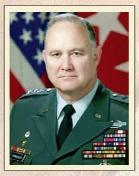
After he improved the battalion, it was reassigned to a place Schwarzkopf described as a horrible, malignant place called the Batangan Peninsula. It was an area that had been fought over for thirty years, was covered with mines and booby traps, and was the site of numerous weekly casualties from those devices.
Schwarzkopf made the best of a bad situation. He introduced procedures to greatly reduce casualties, and whenever a soldier was injured by a mine, he flew out to check on the man, evacuated him using his personal chopper, and talked to the other men to boost their morale.
On May 28, 1970, a man was injured by a mine, and Schwarzkopf flew to where he lay. While his helicopter was evacuating the soldier, another man stepped on a mine, severely injuring his leg. The man thrashed around on the ground, screaming and wailing. Thats when everyone realized the first mine hadnt been a lone booby trap. They were in fact standing in the middle of a minefield.
Schwarzkopf believed the injured man could survive, and even keep his legbut only if he stopped flailing around. There was only one thing Schwarzkopf could do. He had to go after the man and immobilize him. In his autobiography, It Doesnt Take a Hero, Schwarzkopf wrote:
I started through the minefield, one slow step at a time, staring atthe ground, looking for telltale bumps or little prongs sticking upfrom the dirt. My knees were shaking so hard that each time I tooka step, I had to grab my leg and steady it with both hands before Icould take another.... It seemed like a thousand years before Ireached the kid.
The 240-pound Schwarzkopf, who had been a wrestler at West Point, then pinned the wounded man and calmed him down. It saved the mans life. And eventually with the help of an engineer team, Schwarzkopf was able to get him and the others out of the minefield.
Next page
